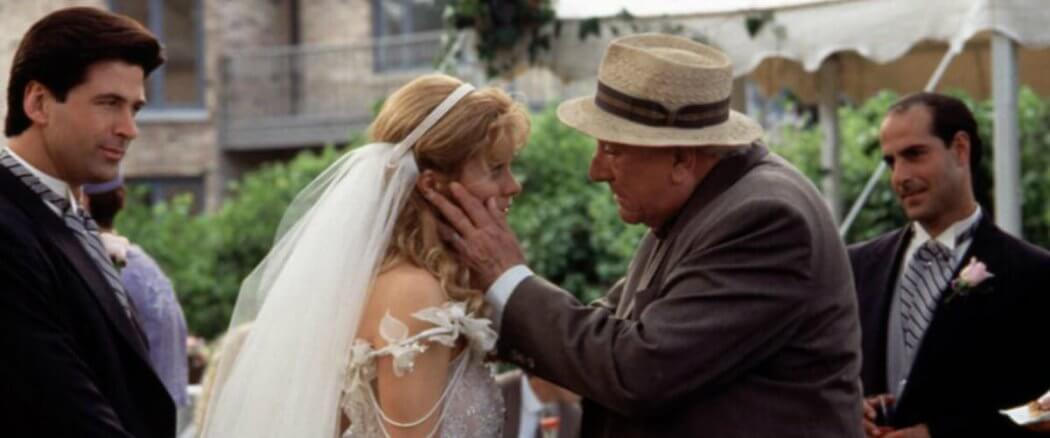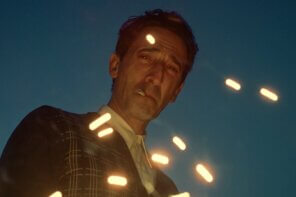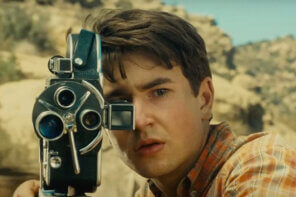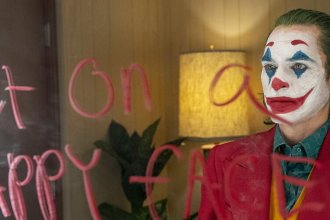It’s been a decade since I graduated from film school, so maybe I’m forgetting, but I don’t remember studying the opening shot of Prelude to a Kiss. Yet it calls to be studied, much like the common basilisk lizard. You know, the one that walks on water.
The camera begins by gazing at an upside-down reflection of the Wrigley building clock tower in a puddle, rights itself, floats along the ground until it finds a wall, following a vine all the way up to the ledge of a roof, to the branches of veins in Alec Baldwin’s hand, to a watch on his wrist, climbing the sleeve of his watercolored blue shirt, to, finally, his gazing eyes behind gigantic glasses, reflecting the tower. It’s continuous, gorgeous, and circuitous; it establishes everything and reveals nothing.
The Wild Blue
“I love the little sign when you buy your ticket to the roller coaster: Ride at Your Own Risk,” Baldwin narrates, “as if the management is not at all concerned with your safety, the entire contraption is about to collapse, and to top it off, there are supernatural powers out there just waiting to pull you off the tracks and out into your worst, cruelest nightmare, the wild blue. They want you to believe that anything can happen. And they’re right.”
The writer of these words, Craig Lucas, knows just how right they are. As an infant, he was abandoned by his birth parents and adopted by the couple that discovered him. Prelude is littered with laments about bringing children into this precarious world and being totally alone; however, the film is not cynical, or ironic. Occasionally it assumes those postures of modern sophistication, but only as permission slips for Lucas to go on a field trip of faith – to condemn the injustice of the universe before he trusts it again.
And, as Billy Joel wrote, love is a matter of trust. But first there is the passionate start, which in this story is Peter (Alec Baldwin) and Rita (Meg Ryan), meeting at a party and dancing to the Divinyls singing “I search myself, I want you to find me / I forget myself, I want you to remind me.” Through a series of scenes they talk about Peter’s terrible family and lay on the floor eating cereal out of the box. Soon all of Peter’s clothes find their way over to Rita’s and he is asking “will you marry me?” and she is saying “uh huh.”
Practical Metaphors
What happens next is the determining factor in Prelude’s partial classification as fantasy, but it is not a plot device, it is one of many practical metaphors with limitless permutations of meaning. At Peter and Rita’s wedding, an old man (Sydney Walker) appears, congratulates the couple, and asks to kiss the bride. The kiss has cosmic proportions – the sun eclipses, a wind passes through – and the old man and Rita exchange bodies. This is a common conceit in movies, usually exploited for comedic effect, such as in Freaky Friday and Trading Places. With Prelude, it is the impetus for a spellbinding contemplation of identity, belief and love.
 All three converge in one of the film’s most purely realized scenes. Coping with a hyperbolic post-honeymoon syndrome, in which Rita is quite literally a different person, definitely not the one with whom Peter fell in love, he wanders out of their apartment and into the bar where Rita used to work. The place is lit like a vigil for Technicolor, with candle vases of green, red, yellow and blue, as the restless resignation of “Someone Like You” plays in the background.
All three converge in one of the film’s most purely realized scenes. Coping with a hyperbolic post-honeymoon syndrome, in which Rita is quite literally a different person, definitely not the one with whom Peter fell in love, he wanders out of their apartment and into the bar where Rita used to work. The place is lit like a vigil for Technicolor, with candle vases of green, red, yellow and blue, as the restless resignation of “Someone Like You” plays in the background.
The old man is there, of course, and Peter is drawn to him. On a line of questioning which departs from déjà vu and makes stops at inside jokes and shared memories, Peter arrives in a homecoming embrace with the old man. The bartender looks on and Baldwin’s facial expression flashes how must this look, but just as the comedy peaks, it moves at the speed of light into empathy so deep you may not be able to climb out of it: here is one man expressing affection for another man, not because they are both attracted to men, but because their souls are attached. “I’m just going to walk the old guy down to the train,” Peter explains to the bartender, as they leave together. Was love ever so embarrassingly and beautifully declared?
The Vine and the Branches
In the above scene, as in the best moments of Prelude, Alec Baldwin fills his hyperrealistically blue eyes with loneliness and unblinked tears until they are like rolling ball fountains – lovely and solitary and transfixing.
But then perhaps this is because I kept imagining Peter as the writer’s stand-in, a character rolling away from the family tree that dropped him before he was grown. Prelude is overrun with trees and vines, outside of doors and windows and inside painted on walls. It seems apart from them, everyone can do nothing. Even Rita’s hair is a sprawling mass of strands, sprouting from the top of her head, which Peter runs his fingers through in grateful disbelief.
At first I was disappointed with the final line; it sounds like a flat affirmation of secular humanism, a philosophy that basically believes wax figures exist independent of their celebrity inspirations, which is partially true and absolutely false. But the disappointment faded when I remembered a scene earlier in the film where Rita’s father attempts to complete a puzzle of M.C. Escher’s Drawing Hands. With one glance that lithograph appears a circular act of self-creation and self-will, but maybe it is art creating art, in the image of its Artist. Maybe it is in the eye of the beholder.





